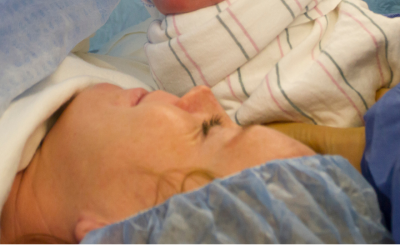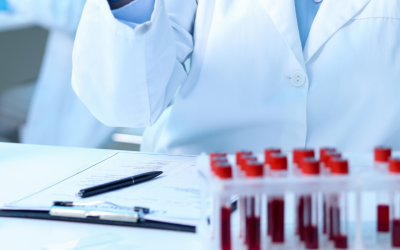
Baby’s DNA in mom’s blood may be a warning sign of preeclampsia
New cells in your body are constantly being created while old cells are dying. During this process of cell death (a process called apoptosis), pieces from your old cells can be found floating in your blood- including your DNA. When you are pregnant, this process can also happen to your placenta’s cells as they are created and die- which have your baby’s DNA inside of them. So during pregnancy, doctors and scientists can take a sample of a pregnant woman’s blood and separate out what is called cell free DNA (meaning DNA found floating in the blood, outside a cell). You can also tell the difference between mom’s cell free DNA and the baby’s cell free DNA. Since preeclampsia is often accompanied by a “damaged” placenta- researchers for this study asked if a higher level of baby’s cell free DNA measured in the moms’ blood might be a warning that the placenta could be damaged. If so, this could help predict preeclampsia before any clinical symptoms are present. To answer this question, the researchers enrolled 580 pregnant women and collected their blood in the first, second, and third trimesters. At the end of the study, 20 of these women (out of 580) had developed preeclampsia. The researchers picked 22 similar patients that did not develop preeclampsia and compared the levels of cell free DNA from the baby in the mom’s blood in each trimester for both groups. Researchers found that the cell free DNA levels from the baby were significantly higher in mothers who went on to develop preeclampsia in all three trimesters compared to the mothers that didn’t develop preeclampsia. This study shows that measuring baby’s cell free DNA in a pregnant woman’s blood could be a promising test to predict preeclampsia. More research is needed to study the accuracy of this test in a larger group of patients.
Link: https://pubmed.ncbi.nlm.nih.gov/33475978/
About Research Roundup
Each quarter, our team of researchers reviews the most current studies related to hypertensive disorders of pregnancy and selects those studies they feel will be of greatest interest to our community to summarize.
Special thanks to our volunteer research team, who under the leadership of Dr. Elizabeth Sutton, make Research Roundup possible: Alisse Hauspurg, MD Felicia LeMoine, MD Jenny Sones, PhD, DVM, and Robin Trupp, PhD, RN.
Related Articles

Your story is needed to improve outcomes for moms like you. Add your voice to critical preeclampsia research to ensure that every story is heard.

Frequently asked questions about the Preeclampsia Registry, a patient-driven registry and biobank.

The Preeclampsia Foundation offers research funding, study recruitment, and other patient engagement services to researchers.

We provide research grant funding to advance progress towards detection, prevention, or treatment of preeclampsia, HELLP syndrome, and other hypertensive disorders of pregnancy.

Recent findings in preeclampsia research have shown that preeclampsia likely has at least two variants – an early onset and a late onset variant. Early onset is typically defined as before 34 we...

Preeclampsia is a pregnancy complication marked by new-onset high blood pressure and signs of stress on organs such as the kidneys, liver, and brain. While much attention is often given to preterm dis...

Preeclampsia is a serious problem that can happen during pregnancy. It often affects the brain and can cause headaches, vision problems, strong reflexes, and seizures (called eclampsia). In this study...

Pregnancy offers a unique window into a woman’s future heart and cardiovascular health. Conditions such as hypertensive disorders of pregnancy (HDP) which include gestational hypertension, preec...

Heart disease, also called cardiovascular disease (CVD), is becoming more common in young women across the United States. Hypertensive disorders of pregnancy (HDP) is a group of conditions that includ...


